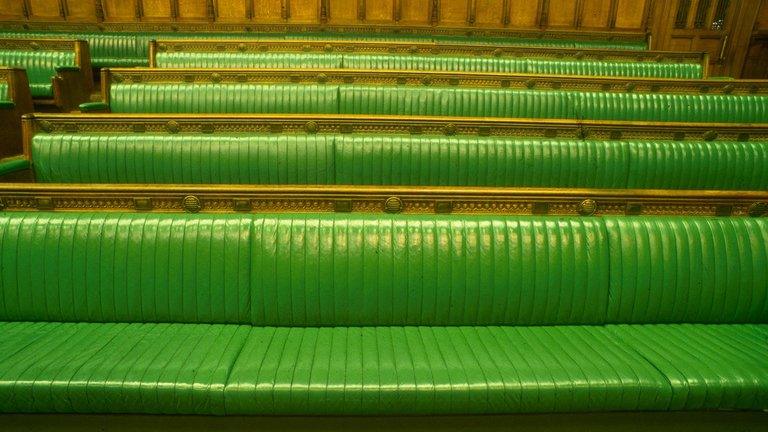Election 2015: The 'alternative' social networks being used to win over voters
- Published
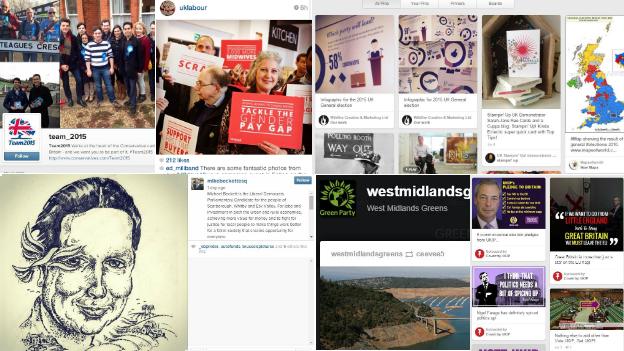
Social networks like Instagram, Google Plus and Pinterest have become more popular with politicians
The positives of Facebook and Twitter - and their potential pitfalls - are well-recognised by politicians and the sites are abuzz with candidates seeking to connect with voters. But what about the likes of Instagram, Pinterest, Tumblr or Vine - how are they being used, and can they be effective?
Look around you. Someone nearby will be looking at their mobile phone.
It's likely that they are scrolling through their newsfeed on Facebook or Twitter, of course, but they could also be applying the perfect filter to their Instagram photos, creating a witty six-second Vine or sharing a beautiful picture they discovered on Pinterest.
Politicians have been getting in on the action too.
On Instagram, Labour leader Ed Miliband has more than 3,700 followers, who "like" his campaign posts and often comment with messages of support.
David Cameron has a profile on the short-form video sharing site Vine which has attracted more than 18,800 followers, but he is yet to post any videos.
And on Google Plus, Nick Clegg's profile has been viewed 1.2m times, although he does not appear to have used the site since August 2014.
Why have politicians turned to using these kinds of social network? And will they make any difference to the election result?

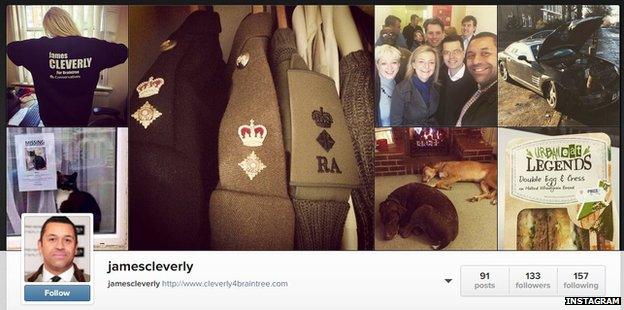
James Cleverly, the Conservative candidate for Braintree, posts personal and political pictures on Instagram
With almost 100 posts to his name, Conservative parliamentary candidate for Braintree in Essex, James Cleverly, is a firm believer in the power of Instagram.
"The great advantage is the whole 'a picture is worth 1,000 words' thing - it's very visually orientated.
"It's good for when you're not trying to ram a political message down someone's throat. You're saying 'I'm human too'.
"Some things politicians get to do are cool, some are a bit nerdy - and being able to combine those elements with family things on Instagram, hopefully people will find that interesting," he said.

'Who even uses Google Plus??'
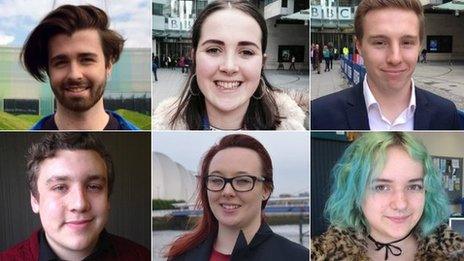
Young voters who are part of the BBC's Generation 2015 panel have their say on the politicians' efforts on Instagram, Pinterest, Tumblr and other social networks.
More information on Generation 2015 is available here and on Twitter, external.

Mr Cleverly said he found different social networks had developed "digital personalities of their own".
"You can put pictures and some words up on Twitter, Facebook, Instagram, and on that level they're all the same. But I know for a fact I can put the same words and pictures up on different platforms and get a totally different tone of response.
"Instagram has more of an emotional connection. People seem to take it in the spirit it's meant, you don't get lots of negative response like you might elsewhere."
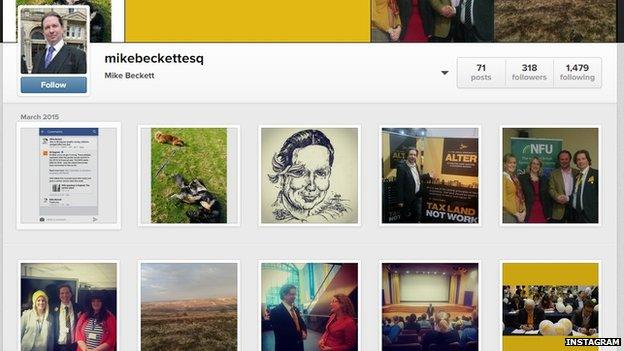
Liberal Democrat candidate for Scarborough and Whitby Michael Beckett tries to post a photo once a day
Liberal Democrat candidate for Scarborough and Whitby, Michael Beckett, has been trying to post a photo on Instagram each day on the advice of a friend who works in marketing and social media.
"I want to connect with younger voters. I think other parties are chasing the grey vote, and there's nothing wrong with that, but older people have often already made up their minds about how they're going to vote.
"Young people are more open. I want to try to engage them and get them involved with politics," he said.
Mr Beckett described himself as an "early adopter" of Google Plus, where he said he had "worked hard" to gain almost 15,000 followers.
"I post more serious things on there, I get a bit more conversation. You can have a meaningful debate," he said.

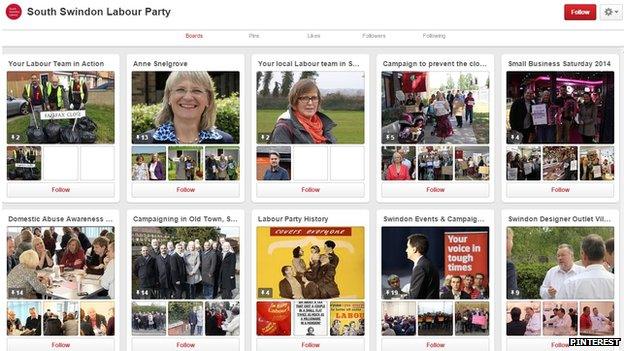
South Swindon's Labour Party started using social scrapbooking site Pinterest in 2013
Although an increasing number of politicians' profiles pop up on Instagram, fewer can be found on Pinterest.
Created in 2010, the social scrapbooking site allows users to curate collections of images from across the web, grouped in different "boards" or categories.
South Swindon Labour Party has been "pinning" since 2013, and shares pictures of litter picks, small business events and Labour posters from the 1950s.
The group's IT co-ordinator, Chris O'Brien, said the aim of the page was to "engage with people outside of the two main channels you generally think of as social media - Facebook and Twitter".
The site's users, said Mr O'Brien, are primarily women aged 35-50, but the party's page had a "mix of people" connecting with it.
"Pinterest is very definitely not focused towards political content, even at the level of board categories. We have to put our things in 'other'.
"But there's a fair bit of content on Pinterest from people in Swindon. So we mainly wanted to break into that, because the content we post isn't overtly political all of the time.
"Every bit of contact with voters helps. We put in an equal amount of effort to reach people on every social network."

An expert's view
"There has been a shift in the way people consume media since 2010 - especially as we have seen social media platforms mature," said Paul Greenwood, from We Are Social, a global social media marketing agency.
"Time spent on digital has increased 250% between 2010 and 2014."
He said political parties had started using alternative social networks to reach out to voters, with Labour's use of Instagram being noteworthy for its reflection of "grassroots" campaigning - a strategy employed by Barack Obama in his 2012 campaign.
Mr Greenwood theorised that some politicians were using social media as a "listening exercise", seeing how people reacted to their posts before refining the idea, optimising it, and using it elsewhere in campaigns.

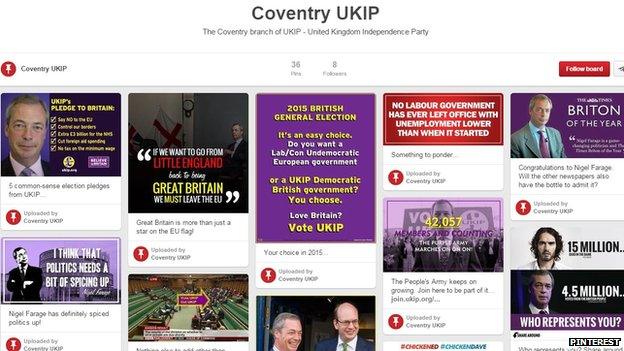
Coventry UKIP set up a Pinterest page a few months ago alongside its profiles on other social networks
Coventry UKIP set up a Pinterest page a few months ago and has so far pinned 38 images featuring quotes, statistics and slogans.
The party's candidate for Coventry North East, Avtar Taggar, said setting up a Pinterest profile was "an experiment to see what would work".
The group's "most successful" social networking presence was on Twitter, with a total of 1,800 followers, Mr Taggar said.
"I think Pinterest will start to be used more and more by political parties," he added.
"When it comes to printing up leaflets and posting them through letter boxes, social media is a much better, quicker, cheaper option. But you have to give people a reason to keep coming back."

Tumblr
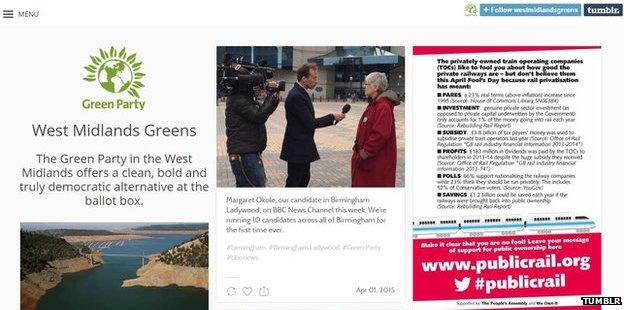
West Midlands Green Party is hoping its Tumblr page will attract younger voters who use the site
If politicians using Pinterest are few and far between, political groups using Tumblr are even harder to find.
The site has been around since 2007, but remains largely the preserve of young people - about half of its monthly users, external are aged 16-24.
It is a platform the West Midlands Green Party has been using for a few months to "reach out to voters, especially younger people".
Scott Redding, the party's regional press officer, said the site was "more about personal identity and social movement politics" than alternative networks.
His party's blog brings together images and text supporting its message, and can be shared and followed by other Tumblr users.
"There's been a rise in Green Party image-based campaigning over the last year on Facebook, and Tumblr's another way of pushing that out," Mr Redding said.
"We're getting some response from it, but the Holy Grail would be something that goes viral. All I can do is try things out and see what works."
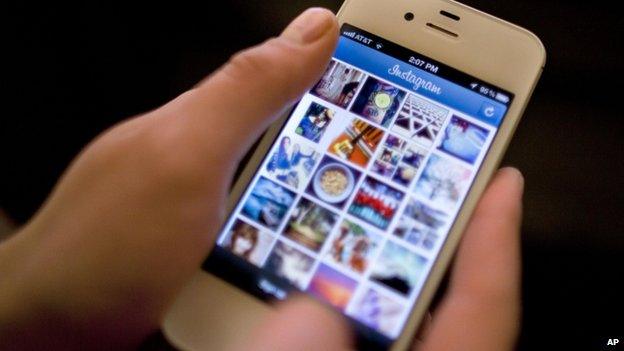
Will politicians' use of Instagram or other social networks really make a difference?
So will the use of these "alternative" social networks prove an effective part of candidates' campaign strategies?
Christian Fuchs, Professor of Social Media at the University of Westminster, is not convinced.
He believes the use of social networks in the run up to the election is only serving to accelerate the speed of politics.
"Politics and debates need space and time. You can only explain how problems can be overcome if you take time to do it," he said.
Professor Fuchs said there were limitations on how useful networks like Instagram and Pinterest could be for a politician.
"Images make it difficult to transport a complex political message - it's hard to do it in a good way.
"In my opinion, what works well is a combination of all sorts of multimedia dimensions. Not just text, image and video, but a combination of all of it," he said.
"Lots of platforms focus on just one thing. Political platforms need to bring it all together."
- Published12 April 2015
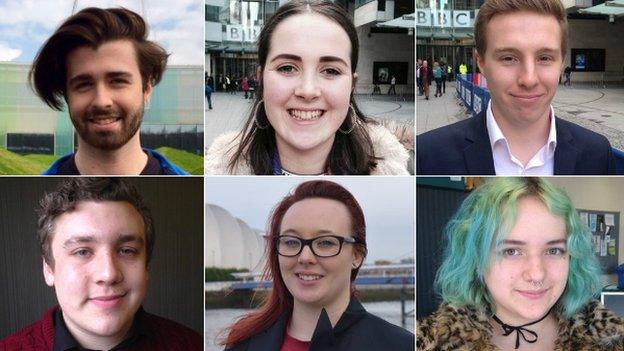
- Published10 February 2015
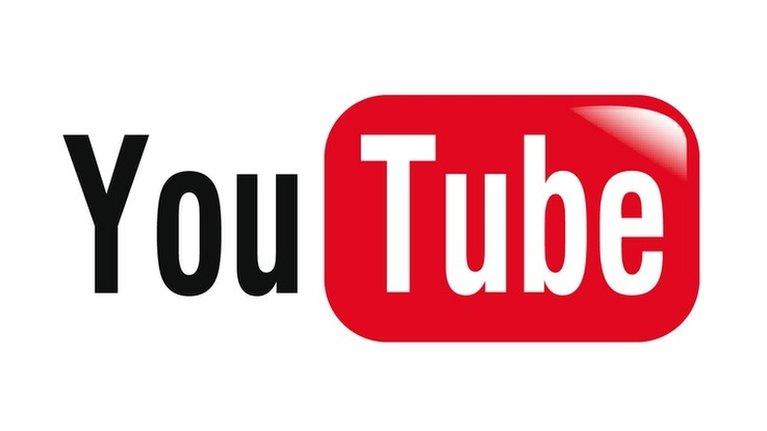
- Published5 February 2015
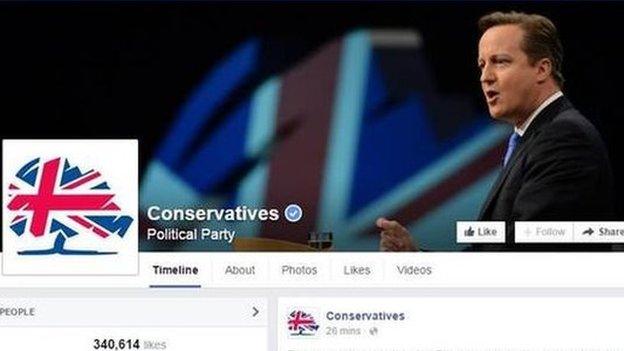
- Published13 September 2012
